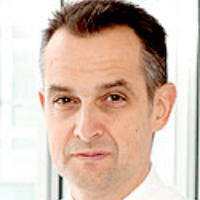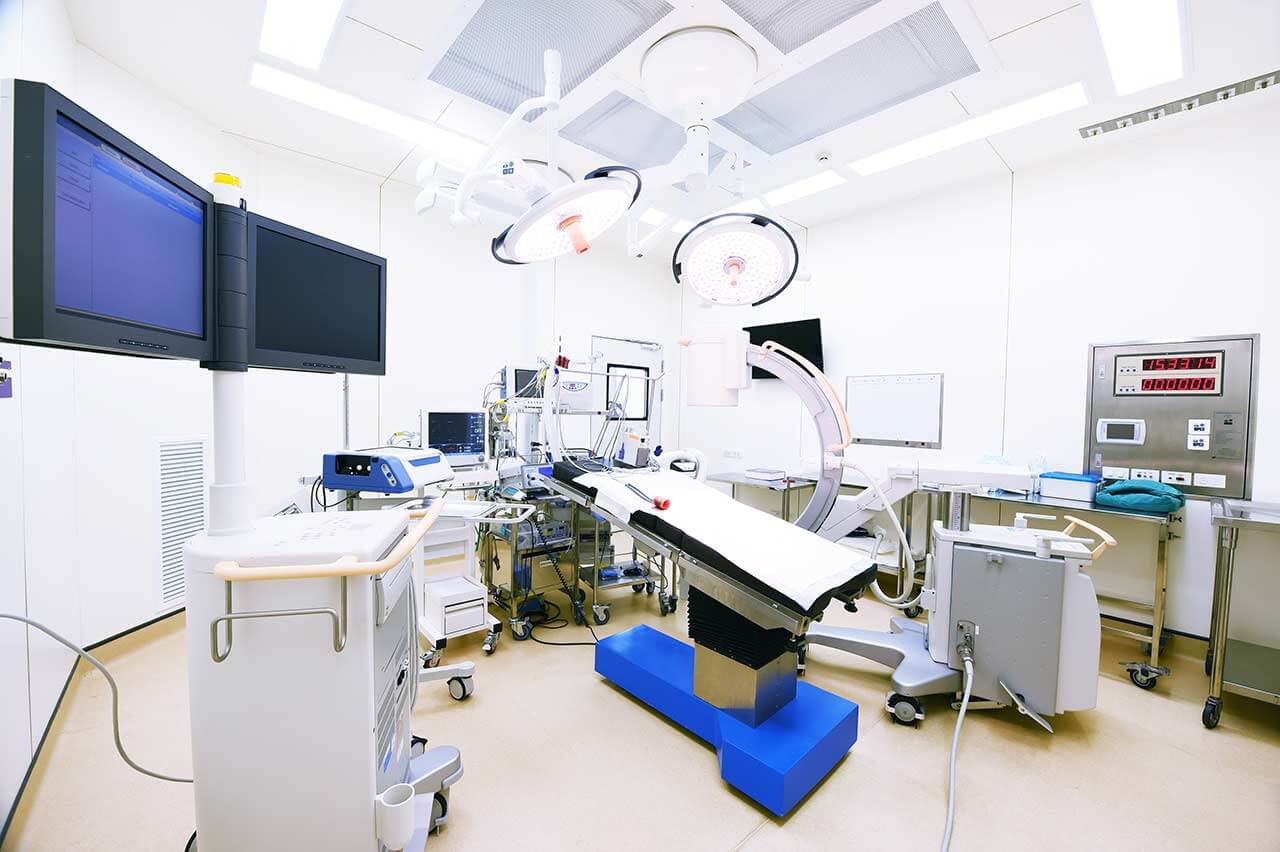
The program includes:
- Initial presentation in the clinic
- clinical history taking
- review of medical records
- physical examination
- laboratory tests:
- complete blood count
- general urine analysis
- biochemical analysis of blood
- TSH-basal, fT3, fT4
- tumor markers
- inflammation indicators (CRP, ESR)
- indicators of blood coagulation
- abdominal ultrasound scan
- CT scan/MRI or PET-CT of abdomen
- preoperative care
- cytoreductive surgery to remove visible tumors
inside the abdomen and HIPEC - histological and immunohistochemical
examination of removed tissues - symptomatic treatment
- cost of essential medicines
- nursing services
- stay in the hospital with a full board
- accommodation in a 2-bedroom ward
- elaboration of further recommendations
How program is carried out
During the first visit, the physician will conduct a clinical examination and go through the results of the available diagnostic tests. After that, you will undergo the necessary additional examination, such as the assessment of liver and kidney function, ultrasound scan and tomography of the abdominal organs. Based on the results of the examination, the physician will choose the surgical technique and the type of anesthesia. After that, preparation according to the preoperative standard will start.
Cytoreductive surgery begins with general anesthesia. The intervention is performed as open surgery, i.e. through the incision in the anterior abdominal wall, so that the surgeon can carefully examine the peritoneum and the surface of the abdominal organs. The surgeon removes affected by the malignant process areas of the small intestine and peritoneum, metastases in other internal organs. This stage of the operation can take several hours, since the overall effectiveness of the treatment depends on the completeness of the malignant tissues removal.
At the next stage of the operation, the surgeon inserts several catheters into the abdominal cavity. Through the catheters, a heated solution of a chemotherapy drug is pumped inside. The special system maintains the required temperature (42-43 degrees Celsius), pressure and circulation rate of the medicinal solution. The solution mechanically flushes out blood clots and remnants of malignant tissues, and a heated chemotherapy drug destroys micrometastases in internal organs and lymph nodes (micrometastases can’t be detected by the naked eye).
After 1-1.5 hours, the chemotherapy drug is removed from the abdominal cavity and the abdominal cavity is washed with saline. After that, the surgeon removes the catheters and sutures the incision of the anterior abdominal wall.
After the completion of the operation, you will be transferred to the ward of the intensive care unit, under the round-the-clock supervision of doctors and nurses. In 1-3 days after the operation, your drains will be removed and you will be transferred to a regular ward for further recovery. The whole treatment takes 10-12 days on average.
Finally, the attending physician will evaluate the results of control examinations, schedule the date of discharge from the hospital and give you detailed recommendations for further follow-up and treatment.
Required documents
- Medical records
- MRI/CT scan (not older than 3 months)
- Biopsy results (if available)
Service
You may also book:
 BookingHealth Price from:
BookingHealth Price from:
About the department
The Department of General, Abdominal, Thoracic and Vascular Surgery at the University Hospital Bonn offers the full range of diagnostic and treatment services in these areas. The special competence of the department’s specialists lies in the field of surgical treatment of malignant diseases of the esophagus, stomach, intestines, liver, pancreas, lungs, thyroid, adrenal glands and tumor metastases in tissues and organs. The service spectrum is complemented by transplant surgery, namely liver and pancreas transplantations. Key role is played by interdisciplinary collaboration. The Chief Physician of the department is Prof. Dr. med. Jörg C. Kalff.
The treatment plans for cancer patients are developed by the interdisciplinary teams, which include specialists from all the relevant fields. If necessary, surgery is complemented by chemotherapy and/or radiation therapy. To operate with less damage to the body and to accelerate patient recovery after surgery, preference is given to minimally invasive surgical interventions.
Another department’s competence is abdominal surgery that focuses on surgical procedures performed in the abdominal region. These include diseases of the esophagus, stomach, small intestine and colon, spleen, liver and gallbladder (gastrointestinal surgery), as well as the thyroid gland, parathyroid glands, adrenal glands and pancreas (endocrine surgery). The use of modern minimally invasive techniques provides a more sparing and safe treatment for the patient.
One of the most common diagnoses faced by surgeons of the department is lung cancer (bronchogenic cancer) and lung metastases from cancer in other organs. In addition, the tasks of the department’s thoracic surgeons include the treatment of tumors and metastases to the mediastinal organs (thymic tumors, neurogenic tumors, etc.), pleural tumors, inflammatory diseases of the lungs and pleura, pneumothorax, vascular anomalies of the lungs, etc. The doctors use multimodal treatment programs that combine chemotherapy and/or radiation therapy with surgery in different sequences.
The vascular surgery team has an excellent reputation. Thanks to close cooperation with the Departments of Radiology and Interventional Angiology, along with surgery, the department offers all endovascular and interventional treatments, as well as special methods, such as endoluminal therapy of the infrarenal aortic aneurysm using stent graft. Major interventions on the thoracic aorta are performed in collaboration with the Department of Cardiovascular Surgery using a heart-lung machine.
The department’s diagnostic and therapeutic service range includes:
- General surgery
- All standard operations (surgical treatment of hernia, etc.)
- Surgical treatment of internal organs (thyroid, etc.)
- Surgical repair of minor defects (skin abscesses, etc.)
- Surgical oncology
- Esophageal cancer
- Gastric cancer
- Pancreatic cancer
- Surgical treatment of metastases and peritoneal carcinomatosis
- Abdominal surgery
- Treatment of benign tumors of the esophagus, stomach, small and large intestine, spleen, liver, biliary tract (surgical gastroenterology)
- Surgical treatment of the thyroid gland and parathyroid glands, adrenal glands and pancreas (endocrine surgery)
- Treatment of diseases of the colon, small intestine and rectum (colorectal surgery and proctology)
- Treatment of malignancies of the liver, pancreas, bile ducts and gallbladder (hepatopancreatobiliary surgery)
- Thoracic surgery
- Lung cancer
- Lung metastases
- Benign lung tumors
- Tumors and metastases in mediastinal lymph nodes
- Pleural tumors
- Inflammatory diseases of the lungs and pleura
- Pneumothorax
- Formation of effusion (pleurisy)
- Pulmonary emphysema
- Vascular anomalies of the lungs
- Benign and malignant tumors of the skin, subcutaneous fat, muscles in the thorax and chest wall
- Vascular surgery
- Surgical treatment of diseases of the arteries, veins and lymphatic vessels
- Transplant surgery
- Liver transplantation
- Pancreas transplantation
- Surgical treatment of other diseases and malformations
Curriculum vitae
Education
- 1981 - 1987 Study of Human Medicine, RWTH Aachen.
- 1986 - 1987 George Washington University School of Medicine, Washington DC, USA.
- 1988 Doctoral degree, RWTH Aachen. Thesis: "Evaluation of oxygen absorption by patients on artificial lung ventilation in the intensive care unit by indirect calorimetry and using the Fick principle: a methodical comparison."
- 1999 Habilitation, University of Bonn. Thesis: "Molecular mechanisms of postoperative intestinal motility disorders".
Professional Background
- 1989 - 1999 Head of the Medical Service in the Federal Armed Forces, emergency care in the city of Aurich, Richthofen squadron, Wittmund.
- 1989 Research Associate in the Department of Surgery at the University Hospital Bonn.
- 1991 Visiting Doctor, Thomas E. Starzl Transplantation Institute, University of Pittsburgh Medical Center, PA, USA.
- 1993 Visiting Doctor, Department of Pediatric Transplantation, Children's Hospital of Pittsburgh, University of Pittsburgh, PA, USA.
- 1995 Qualified as a Medical Specialist in Surgery.
- Research Associate, Department of Surgery, University of Pittsburgh, Pittsburgh, PA, USA (Richard L. Simmons, M.D.).
- Research grant from the German Research Foundation (2 years), "Ischemia/reperfusion injury of the tunica muscularis of the small intestine", Departments of Surgery, Internal Medicine, Hepatology and Gastroenterology, University of Pittsburgh, Pittsburgh, PA, USA.
- Senior Physician in the Department of General, Abdominal, Thoracic and Vascular Surgery at the University Hospital Bonn (Head: Prof. Dr. A. Hirner).
- 1999/2000/2001 Visiting Assistant Research Professor, Department of Internal Medicine/Gastroenterology, University of Pittsburgh, Pittsburgh, PA, USA.
- 2001 Board Certification in Vascular Surgery.
- 2002 Board Certification in Abdominal Surgery.
- Since 2003, Scientific Director of the Clinical Research Group 115 of the German Research Foundation (Molecular and cellular basis of bowel pathophysiology after surgical interventions).
- 2003 Invitation to C3 Professorship (postoperative pathophysiology), University of Bonn.
- 2005 Leading Senior Physician in the Department of General, Abdominal, Thoracic and Vascular Surgery at the University Hospital Bonn (Head: Prof., Dr. A. Hirner).
- 2007 Additional qualifications in Proctology.
- 2009 Head of the Section of Transplantation and Hepatobiliary Surgery in the Department of General, Abdominal, Thoracic and Vascular Surgery at the University Hospital Bonn.
- 2010 Invitation to the position of W3 Professor of General and Thoracic Surgery, University of Kiel.
- 2010 Invitation to the position of W3 Professor of General and Abdominal Surgery, University of Bonn.
Membership and Review Activities in Professional Societies
- 1991 German Society of Surgery.
- 1993 German Society of Transplantology.
- 1998 Professional Association of German Surgeons.
- 2000 Berlin Surgical Society, Association of Surgeons of Berlin and Brandenburg.
- 2000 German Society of Abdominal Surgery.
- 2001 Surgical Studies Section of the German Society of Surgery.
- Association of German Universities.
- Member of the American College of Surgeons (FACS).
Photo of the doctor: (c) Universitätsklinikum Bonn
About hospital
According to the authoritative Focus magazine, the University Hospital Bonn ranks among the top ten medical facilities in Germany!
The hospital was opened on January 1, 2001, although in fact it inherits the medical facility, which operated at the Faculty of Medicine of the University of Bonn. The hospital in Germany combines all the highest standards of modern university medicine of the international level. A highly competent team of experienced physicians, which consists of more than 8,000 employees from various fields, takes care of the patients’ health.
The hospital has 32 specialized departments and 23 institutes, which implement the highest standards of treatment in Germany. On their basis, in addition to the successful clinical activities, the productive research and training of young specialists are carried out. Also, the hospital has 10 intensive care units and more than 30 cutting-edge operating rooms. They are equipped with the advanced surgical, navigation and monitoring systems, which provide sparing and the most effective surgical treatment. The total number of places for hospitalization is 1,250 beds.
The hospital presents all fields of medicine, while many of them are awarded by prestigious German and international certificates. For example, in 2007, the Comprehensive Cancer Center of the hospital became one of the four winners at the nationwide competition among Cancer Centers of Excellence. The research focuses primarily on the clinical genetics and genetic epidemiology, neurology, immunology and infectiology, hepatology and gastroenterology, and diseases of the cardiovascular system. The research findings contribute to the development of new therapeutic methods and overall improvement of treatment in Germany.
The main value for all employees of the hospital in Germany is human health, his individual needs and wishes, therefore, despite the high-tech infrastructure, the focus remains on the human attitude and respect for each patient.
Photo: (с) depositphotos
Accommodation in hospital
Patients rooms
The patients of the University Hospital Bonn live in cozy single, double and triple rooms, designed in bright colors. The standard room furnishing includes a comfortable bed with a remote control, a bedside table, a wardrobe, a table and chairs, as well as a TV and a telephone. Each patient room is equipped with an ensuite bathroom with toilet and shower. The hospital also provides enhanced-comfort rooms.
Meals and Menus
The patients of the hospital are offered tasty and balanced three meals a day: breakfast, lunch and dinner. Every day each meal features three different menus, including a vegetarian one. If you for some reason do not eat all the food, you will be offered an individual menu. Please inform the medical staff about your dietary preferences prior to the treatment.
Further details
Standard rooms include:
Religion
Christian priests are available for the patients at any time. Representatives of other religions may be requested at any time.
Accompanying person
Your companion may stay with you in your room or at a hotel of your choice during the fixed program.
Hotel
You may stay at the hotel during the outpatient program. Our employees will support you for selecting the best option.
The hospital offers a full range of laboratory tests (general, hormonal, tests for infections, antibodies, tumor markers, etc.), genetic tests, various modifications of ultrasound scans, CT scans, MRI and PET / CT, angiography, myelography, biopsy and other examinations. Treatment with medications, endoscopic and robotic operations, stereotaxic interventions is carried out here, modern types of radiation therapy are also used. The hospital offers patients all the necessary therapeutic techniques.
- Surgical treatment of the brain tumors, tumors of spinal cord and spine
- Replacement of all joints, resection arthroplasty
- Deep brain stimulation and vagus nerve stimulation in patients with epilepsy
- Multimodal complex treatment of Parkinson disease
- Thoracic endovascular aortic repair (TEVAR)
These are benign and malignant breast pathologies, malignant tumors of various localizations, neuromuscular diseases, stroke, retinal pathologies and various visual impairments, infertility, autoimmune diseases, epilepsy, coronary artery disease and myocardial infarction, leukemia and other pathologies.
- Ophthalmology
- Epileptology
- Reproductive medicine
- Hematology and oncology
- Neurosurgery
Over 8,000 highly qualified doctors and other employees work at the hospital.





